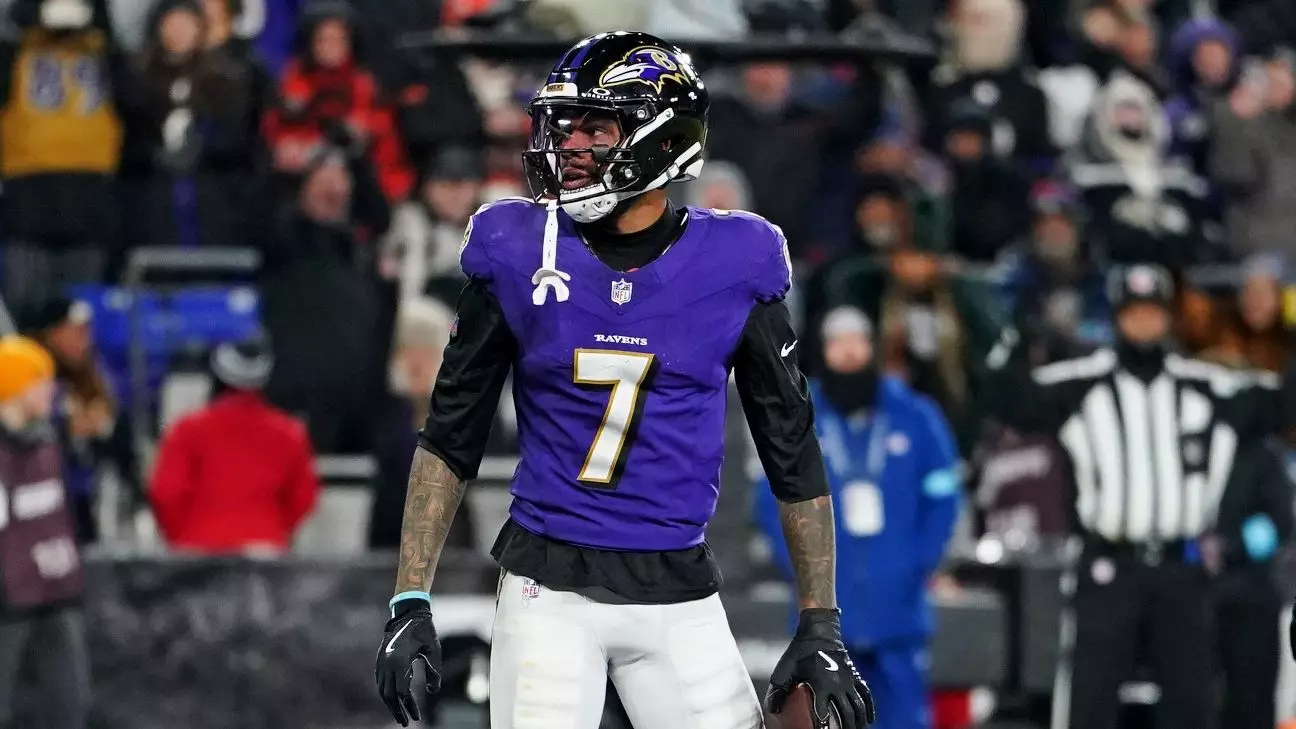In a groundbreaking move for the Baltimore Ravens, Rashod Bateman has officially signed a three-year contract extension valued at $36.75 million, with $20 million guaranteed. This decision, announced on a Thursday that fans will likely remember, signifies a profound shift not just in Bateman’s career trajectory but in the very narrative surrounding the Ravens’ wide receiver position. After spending the last two years in a turbulent environment marked by the criticism of Baltimore’s talent recruitment, this extension presents an exciting pivot towards a brighter future for both Bateman and the franchise.
Bateman’s rise from being the 27th overall pick in the 2021 NFL Draft to becoming the Ravens’ most prolific wide receiver isn’t merely a personal triumph; it embodies a broader transformation in how the team approaches the passing game. After being frequently scrutinized for its long-standing futility in drafting successful wide receivers, the Ravens have now begun rewriting that history, with Bateman and fellow teammate Zay Flowers leading the charge.
From Underachievement to Stardom
Once viewed as a potential underachiever due to injuries and inconsistent performances, Rashod Bateman has proven his critics wrong. Spending significant time on the injured reserve list during his first two seasons would have stunted many players’ careers. However, Bateman’s persistence, determination, and undeniable talent have allowed him to surge into the spotlight. His recent performance featured an impressive average of over 16 yards per reception and a tally of nine touchdown catches, making him the only player in the league to reach such heights last season. These accomplishments aren’t mere statistics; they are a declaration of Bateman’s capabilities and a testament to his dedication to the game.
Football culture often revolves around numbers, and for Bateman to average 16.8 yards per catch—ranking him third in the NFL—is nothing short of extraordinary. He has not only emerged as a deep threat but has also become emblematic of the Ravens’ high-octane offense, which led the league in scoring this past season. Titles like “the best deep threat” are usually reserved for seasoned veterans, but Bateman has made such labels synonymous with his name early in his career.
Changing the Narrative in Baltimore
Bateman’s extension is significant not only for his personal brand but also for the longstanding stigma attached to the Ravens’ wide receiver position. Historically, since the franchise’s inception in 1996, the team has faced a barrage of skepticism regarding its ability to draft Pro Bowl caliber receivers. The implications of Bateman’s deal extend to changing the environment around pass-catching talent in Baltimore.
In a sport where narratives are often set in stone, Bateman’s success could pave the way for future drafts. His recognition as the first Ravens’ first-round wide receiver to secure a second contract—and now a third—is groundbreaking. It speaks volumes about the Ravens’ trust in his skills and the organization’s evolving philosophy regarding the significance of a dependable aerial attack.
“Hitting different when it’s a receiver here,” as Bateman mentioned, rings with authenticity. The haunting history of failed draft picks has weighed on the organization and its loyal followers. Thriving against this backdrop not only highlights his accomplishments but positions him as a linchpin in a new era of Ravens football.
Unity and Vision
The relationship that Bateman has cultivated with Lamar Jackson—the centerpiece of the Ravens’ offensive efforts—is another factor underscoring the significance of this deal. Bateman refers to his role as being in service to Jackson, a sentiment that fosters unity and purpose in their pursuits. This connection is further mirrored in Bateman’s assertions about respect and belief—essential elements for success at any level of sports. Contract extensions in the NFL aren’t just numbers; they represent trust and faith between the player and organization.
That Bateman was once disheartened enough to confront the Ravens’ front office about their drafting history exemplifies the shifts in thinking surrounding the team’s approach to player development. His subsequent conversations with general manager Eric DeCosta, moving from criticism to a positive relationship, showcase the evolution of leadership and accountability within the organization.
As Rashod Bateman embarks on this next chapter in his career as one of the central figures in the Ravens’ offensive strategy, he symbolizes both renewal and resilience. His journey illustrates that with system-wide belief and player-centric practices, even the most beleaguered narratives can be transformed into remarkable success stories.


Leave a Reply